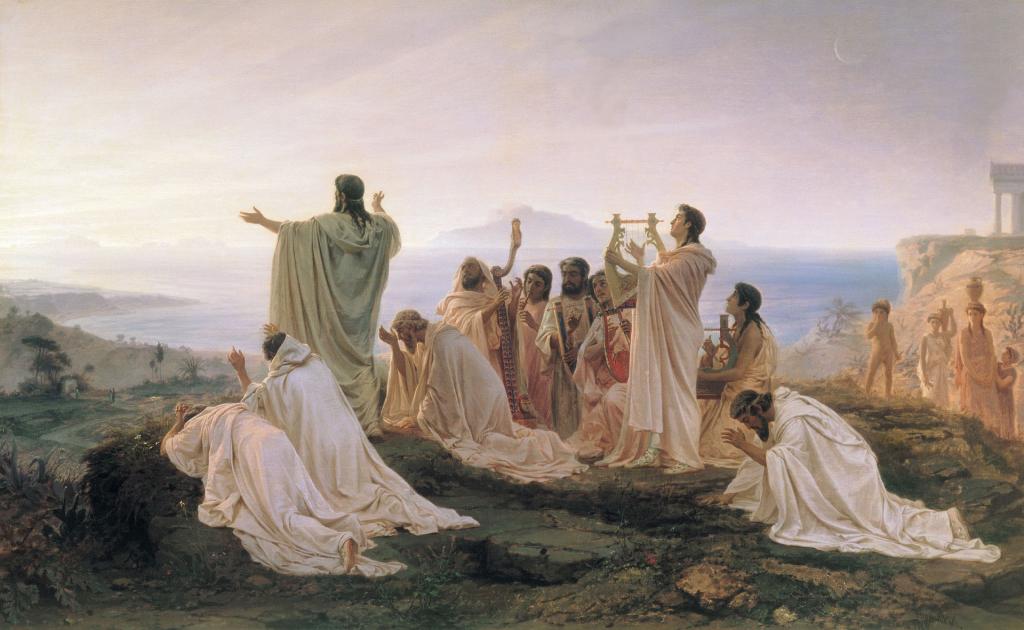
Wikimedia Commons public domain
I first read the Meditations of the Stoic Roman Emperor Marcus Aurelius (AD 121-180) back when I was in high school. I’ve had a deep fondness for him ever since, and (although he himself was a pagan and not particularly friendly toward the novel sect of the Christians) much of what he had to say seems appropriate, in my view, for reflection on the Sabbath:
Ἕωθεν προλέγειν ἑαυτῷ: συντεύξομαι περιέργῳ, ἀχαρίστῳ, ὑβριστῇ, δολερῷ, βασκάνῳ, ἀκοινωνήτῳ: πάντα ταῦτα συμβέβηκεν ἐκείνοις παρὰ τὴν ἄγνοιαν τῶν ἀγαθῶν καὶ κακῶν.
“When you wake up in the morning, tell yourself: The people I deal with today will be meddling, ungrateful, arrogant, dishonest, jealous, and surly. They are like this because they can’t tell good from evil.”
Ὀλίγα πρῆσσε, φησίν, εἰ μέλλεις εὐθυμήσειν
“‘Let your occupations be few,’ says the sage, ‘if you would lead a tranquil life.'”
Ὄρθρου, ὅταν δυσόκνως ἐξεγείρῃ, πρόχειρον ἔστω ὅτι ἐπὶ ἀνθρώπου ἔργον ἐγείρομαι· ἔτι οὖν δυσκολαίνω, εἰ πορεύομαι ἐπὶ τὸ ποιεῖν ὧν ἕνεκεν γέγονα καὶ ὧν χάριν προῆγμαι εἰς τὸν κόσμον; ἢ ἐπὶ τοῦτο κατεσκεύασμαι, ἵνα κατακείμενος ἐν στρωματίοις ἐμαυτὸν θάλπω;
“At dawn, when you have trouble getting out of bed, tell yourself: ‘I have to go to work – as a human being. What do I have to complain of, if I’m going to do what I was born for – the things I was brought into the world to do? Or is this what I was created for? To huddle under the blankets and stay warm?’”
Μηκέθ᾽ ὅλως περὶ τοῦ οἷόν τινα εἶναι τὸν ἀγαθὸν ἄνδρα διαλέγεσθαι, ἀλλὰ εἶναι τοιοῦτον.
“Waste no more time arguing what a good man should be. Be one.”
I’m also fond of this passage from the great UCLA basketball coach John Wooden:
“Make each day your masterpiece.”
I fail at it every day.
Appropriate thoughts, though, all of them, for the early days of a new year.
Marcus Aurelius is especially good in times of tumult or worry. His is a very calm and calming spirit, encouraging us to focus on what’s most important and and on what’s unchanging rather than on the often distressing and almost always distracting things about us.
I see considerable consistency between much of the Emperor’s counsel and some of the teaching of President Thomas S. Monson, whose passing we Latter-day Saints mourn this week:
“Do not pray for tasks equal to your abilities, but pray for abilities equal to your tasks. Then the performance of your tasks will be no miracle, but you will be the miracle.”
“The principles of living greatly include the capacity to face trouble with courage, disappointment with cheerfulness, and trial with humility.”
















